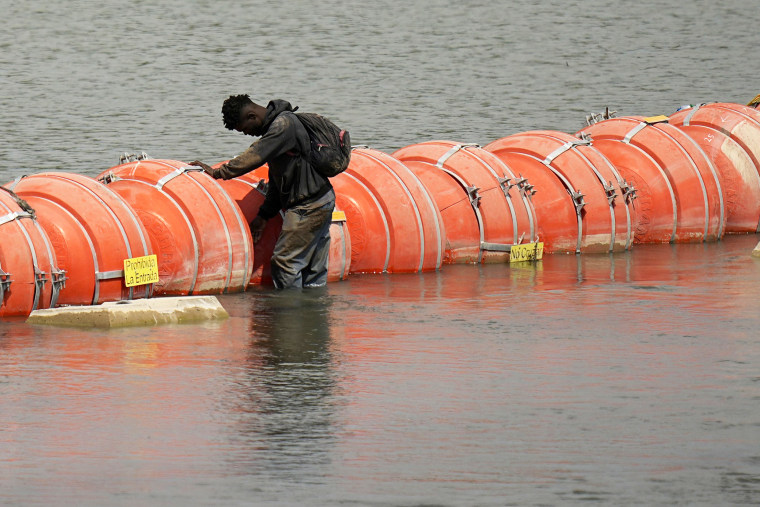In a win for the Biden administration, a federal judge Wednesday ordered Texas Gov. Greg Abbott to remove a floating barrier his state placed in the Rio Grande River to deter illegal migrant crossings.
U.S. District Judge David Ezra, a Reagan appointee, issued an order for the swift removal of the 1,000-foot barrier near Eagle Pass, Texas, granting the Justice Department's request for a preliminary injunction while the case is litigated. He gave the state until Sept. 15 to remove the barrier and prohibited it from building new barriers in the river pending final judgment in the matter.
Ezra, who's based in Austin, said the Justice Department would most likely prevail on the merits of the case when a trial takes places, adding that Texas violated federal law when it installed the barrier system under Abbott's directive.
“Unfortunately for Texas, permission is exactly what federal law requires before installing obstructions in the nation’s navigable waters,” Ezra wrote in a 42-page filing.

The Justice Department filed a civil suit in July arguing that the floating barrier violated the Rivers and Harbors Act, which bars creating any obstruction to the navigable capacity of the country’s waters without authorization.
It also said that the floating barrier “poses risks to health and public safety” by impeding travel across it and that it harms U.S.-Mexico relations.
Attorneys for Texas had countered that the U.S. Constitution gave Texas the authority to “repel invasions,” including the illegal entry of thousands of migrants. They urged the court to hold that the terms of the Rivers and Harbors Act did not apply.
The court sided with the Justice Department on Wednesday, finding that the barrier's threat to human life and "impairment to free and safe navigation" outweighed the state's interest in installing the system.
The Justice Department lauded the ruling.
"We are pleased that the court ruled that the barrier was unlawful and irreparably harms diplomatic relations, public safety, navigation, and the operations of federal agency officials in and around the Rio Grande,” Associate Attorney General Vanita Gupta said in a statement.
Lawyers for Texas appealed the ruling to the 5th Circuit Court of Appeals, while Abbott blasted it as "incorrect" and predicted it would be overturned.
"We will continue to utilize every strategy to secure the border, including deploying Texas National Guard soldiers and Department of Public Safety troopers and installing strategic barriers," Abbott said in a statement. "Texas is prepared to take this fight all the way to the U.S. Supreme Court.”
The floating barrier is part of Texas' fight with the Biden administration over immigration policy.
Abbott sent a letter sent to President Joe Biden in July accusing the administration of impeding his state’s “sovereign interest” in securing its border. In June, he sent 42 migrants by bus to Los Angeles and accused Biden of failing “to do his job and secure the border.”
In August, a 3-year-old child who was riding one of Texas' migrant buses died on the way to Chicago. It was the first death the state had announced in connection with the busing program, which has sent more than 30,000 migrants to Democratic-controlled cities in the U.S., The Associated Press reported.